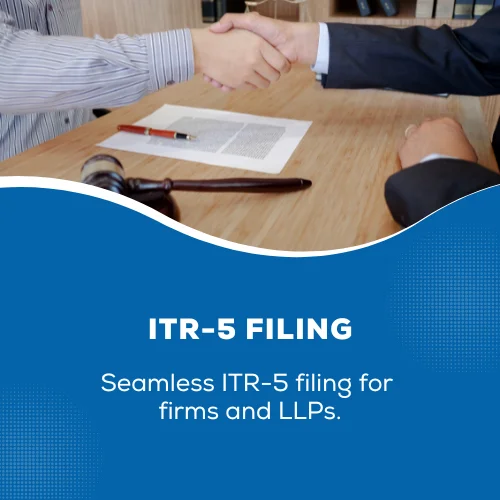ITR-5 Filing
ITR-5 Filing for Firms, LLPs & AOPs – Simplified & Hassle-Free!
It is used to report income from business, profession, house property, capital gains, or other sources.

It is used to report income from business, profession, house property, capital gains, or other sources.
File Your ITR-5 with Confidence – Get Started Now!
- Get Instant Quote
What’s Included ✅
- Consultation on Eligibility for ITR-5
- Preparation & Filing of ITR-5 Form
- Computation of Business & Professional Income
- Balance Sheet & Profit & Loss Preparation (if required)
- Claiming Deductions & Tax Benefits
- Filing Acknowledgment (ITR-V) & E-Verification Support

Exclusive Free Benefits 🎁
- Free check if ITR-5 applies to your entity – no confusion.
- Tips on saving tax for firms & LLPs – smart deductions.
- Refund tracking support – we’ll keep an eye for you.
- Easy-to-follow document checklist (PDF) – everything in one place.
- One free call on tax planning for firms/LLPs – future ready.
- Consultation with CA/CS/Advocate Free for Lifetime
10,000+ Companies & Individuals Put Their Trust In Us
























✅ Clear Guidance: They explained every step in simple, easy-to-understand terms, so I always knew what was happening.
✅ Fast & Efficient: My filing was completed quickly without any unnecessary delays.
✅ Accuracy & Trust: I felt confident knowing my details were handled with care and precision.
✅ Great Support: Any small questions I had were answered patiently and thoroughly.
ITR 5 Form For Income Tax Return Filing
It is a mandatory compliance requirement for the taxpayers in India to file Income Tax Return. There are various ITR Forms prescribed by the Income Tax Department that have been categorized as different types of taxpayers in India. Among these ITR forms, ITR 5 is one such special form designed for the specific entities. Different ITR Forms have been categorized by the government for various taxpayers as per their income sources and structures. You should choose the correct ITR form wisely in order to comply with tax regulations and safeguard your financial interests.
Understand everything about ITR 5 properly with the help of top online income tax return filing portals like Click To Professionals.
What is ITR 5 Form?
Benefits of Filing ITR 5
Compliance With Tax Laws
Income Tax Return Filing will make sure that you meet legal obligations as well as to avoid penalties.
Carry Forward Losses
With the help of Income Tax Return Filing (ITR 5) you can carry forward losses in order to set off in subsequent years.
Easy Approval of Loan and Visa Applications
You can submit the receipts of ITR 5 as the proof of income for the facilitation of loan approvals and visa applications.
Claim Income Tax Refunds
If you file an Income Tax Return, you can claim refunds for excessive TDS or advance tax paid.
Avoidance of Notices
If you file Income Tax Return properly, you can minimize the chances of income tax notices.
Transparency
If you file the returns properly in detail, it will make sure about financial transparency and compliance.
Compliance With Tax Laws
Carry Forward Losses
Easy Approval of Loan and Visa Applications
Claim Income Tax Refunds
Avoidance of Notices
Transparency
Who is Eligible to File ITR 5 Form?
We will provide you with a general understanding of who is typically eligible to file ITR 5 form in India. The ITR 5 form in India is primarily meant for the income from business or profession. Here are the key eligibility criteria for filing ITR 5. It can be filed by the entities who meet some of the specific criteria which are as given below:
- Firms (Partnership Firms as well as Sole Proprietorship Firms)
- LLPs i.e. Limited Liability Partnerships
- AOPs i.e. Association of Persons
- BOIs i.e. Bodies of Individuals
- AJPs i.e. Artificial Judicial Persons
- Cooperative Societies
- Business Trusts and Investment Funds
- Local Authorities

Who is Not Eligible to File ITR 5 Form?
ITR 5 is not applicable to all taxpayers in India. The given entities are not allow to file ITR 5, instead they need to choose some other forms:
- Individual Taxpayers
- HUFs i.e. Hindu Undivided Families
- Companies
- Trusts
- Political Parties
- Institutions that claim exemptions under section 11
Key Features of ITR 5 Form
Structured Sections
This form of ITR consists of numerous schedules that cover different income sources, deductions, and tax computations.
Electronic Filing
It is mandatory to file ITR 5 electronically, except for some cases where forms can use paper forms.
Verification with Digital Signature
LLPs i.e. Limited Liability Partnerships are required to verify their Income Tax Return (ITR 5) with the help of DSC i.e. Digital Signature Certificate.
Income Tax Return Due Date
- The Income Tax Return last date for filing ITR 5 is typically the same as for other forms, providing protection from penalties for late filing
- Usually the last date of filing ITR 5 will be 31st July until there are any changes made by the government
- Audit Requirement: In case, if an entity has a turnover of Rs. 1 Crore or more (for businesses) or Rs. 50 Lakhs or more (for professionals), a tax audit is mandatory as per section 44AB
Structure of ITR 5 Form
- Part A: General Information
- Part A-BS: Balance Sheet
- Part A- Manufacturing Account
- Part A - Trading Account
- Part C: Deductions and Total Taxable Income
- In this section you have to mention about the numerous deductions applicable to you including deductions under section 80D, 80C, 80G, etc.
- You also have to mention the total taxable income after deductions.
- Part A and L: Profit and Loss Account

- Part A-OI: Other Information
- Part A-QD: Quantitative Details
- Part B: Gross Total Income
- Part D: Tax Computation and Tax Status
- Taxes Paid & Verification
Income Tax Return Process
The process of Income Tax Return includes a number of tricky steps. You should have to understand its process properly for which you can seek the professional guidance of expert ITR filing consultants. The major steps are as given below:
- After login, if you are a first time user you have to register yourself.
- If you are the repeat user you have to log in to the website.
- You have to enter your PAN as your user id and then click ‘Continue’.
- You have to check the security message given in the tick box.
- Then, you have to enter your password & click on the ‘Continue’ button.
After that, you have to select the ITR form and you have to choose the ITR 5 then you have to fill the following details:
- Personal information: Your basic details including your full name, PAN, Aadhaar Number, contact details, bank account details.
- Gross total income: You have to enter & verify your total income from all the sources along with the details of exempt income.
- Total deductions: The information about the deductions that you need to be claimed under the different sections.
- Tax paid: Reflects the tax paid by you from all the sources but not been limited to TDS, TCS, Advance Tax & Self – assessment
- Total tax liability: This section reflects the total tax liability as per the information provided by you previously. If the amount is negative then it can be claimed as the refund and if the amount is positive then you have to pay the following amount as tax.
You have to choose the reason for filing the ITR. You have to select the correct option that has been applicable to your situation:
- Taxable income is more than the basic exemption limit
- Meets specific criteria & compulsory requirement of filing the ITR
- Others
Find a local agent for your legal & registration service
+91 8448094507
Phone No.
info@clicktoprofessionals.com
Get Support
Essential Documents Required to File ITR 5
- PAN Card of Entity
- Aadhaar Details (if applicable)
- Financial Statements including Balance Sheet, Profit & Loss Account, etc.
- Tax Audit Report (if applicable)
- Bank Statements
- Bank Account Details
- TDS/ TCS Certificates (Form 26AS, Form 16, Form 16A, etc.)
- GST Returns (if applicable)
- Investment and Expense Records (as deduction proofs)
- Details of Partners/ Members of the Entity

Key Points to Remember While Filing ITR 5
You should take care of some of the key considerations while filing income tax return with the help of ITR 5 which are as given below:
You should have to double-check all the details before submission in order to avoid errors and penalties.
You have to maximize tax-saving instruments as per section 80C as well as other applicable sections.
Common Mistakes to Avoid While Filing ITR 5
Although the process of filing ITR 5 is very simple, still you have to take care of some mistakes that you should avoid while filing this form. Such common mistakes are as given below:
Filing the Wrong Form
You have to make sure that you should meet the eligibility criteria for ITR 5 before proceeding.
Mismatch in Income Details
It will be better to cross-verify the details in Form 16 and Form 26AS and bank statements with the information entered in ITR.
Incorrect Personal Details
You have to declare all your personal details including PAN, Aadhaar, and Bank account details.
Skipping Deductions and Tax Credits
You have to declare all eligible deductions to minimize the tax liability and must verify form 26AS in order to make sure about all TDS Credits are claimed.
Missing the Deadline
Just make sure that you don’t miss the deadline as late filing attracts penalties as per section 234F.
Penalties for Non-Filing of ITR 5
If you fail to file your ITR on time or provide incorrect information can lead to the hefty penalties which are as given below:

Late Filing Penalty u/s 234F
- If you file the ITR after the deadline but before 31st December, a penalty of Rs. 5,000/- may be levied on the taxpayer.
- If you file your ITR after 31st December, the penalty will be of Rs. 10,000/-
- For taxpayers having an income of below Rs. 5 lakhs, the maximum penalty will be Rs. 1,000/-
Interest on Outstanding Tax
- An interest of 1% per month may be charged on unpaid tax liabilities as per the section 234A, 234B, & 234C for delay in payments.
Prosecution
- In severe cases, if you fail to file Income Tax returns may lead to prosecution under the Income Tax Act.
Final Words
ITR 5 is a comprehensive tax return form that has been used by some specific entities including Partnership Firms, Limited Liability Partnerships (LLPs), Association of Persons (AOPs), Bodies of Individuals (BOIs), Artificial Judicial Persons (AJPs), cooperative societies, etc. If you file the form accurately you can make sure about compliance with tax laws along with maximizing deductions and minimizing penalties. It requires accurate reporting of income, deductions, and compliance with tax laws to file the form properly. You can avoid errors and hefty penalties by understanding the eligibility structure and filing process of ITR 5. If you understand properly and file ITR 5 timely, it will reflect responsible citizenship as well as contribute to the growth of the nation.
In order to navigate the complications or doubts you can seek the professional guidance of expert Income Tax Return consultants like Click To Professional.











